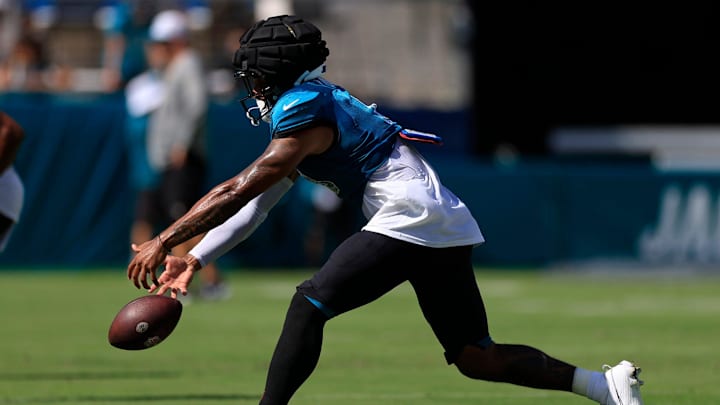The news that the Jacksonville Jaguars released wide receiver Gabe Davis came with a bit of a shock because cutting him created $20 million in dead money. Then again, the move shouldn't be that surprising. After all, the front office made several moves throughout the offseason that indicated that they were willing to bite the bullet.
Davis would've counted a bit over $6 million against the cap if he had stuck around. His release accelerated a cap charge of $13.8 million. On paper, that seemed like a good reason to keep him around, but the Jags didn't want to fall victim to the sunk cost fallacy and cut ties with what turned out to be a disappointing player last year.
A second-round pick by the Buffalo Bills in 2020, Davis signed a three-year deal worth $39 million last offseason. Expected to give the offense a spark, he instead posted a paltry 20 receptions for 239 yards with two touchdowns before he suffered a season-ending knee injury. The team's brass didn't think he was going to bounce back. Otherwise, it might've kept him around. It didn't help that Jacksonville brought in Dyami Brown in free agency and later Travis Hunter in the draft.
With Brown and Hunter in the fold, Davis became a victim of the numbers game. The decision probably came down to whether the Jaguars were willing to eat up the dead money. They did, and the signs were there that they planned to do it.
The Jaguars also ate up dead money when they cut ties with Christian Kirk and Evan Engram
Before free agency, the Jacksonville Jaguars moved on from Christian Kirk, Evan Engram, and Devin Duvernay. All three left a significant amount of dead money.
While the Jags freed up $10 million in space when they traded Kirk to the Houston Texans, it also left $13.6 million in dead money. Similarly, they created $6 million when they cut ties with Engram, but his release created $13.5 million in dead money. Something similar happened with Devin Duvernay, whose release created $3.8 million in dead money. The point is that the team's brass weren't afraid to move on from costly veterans that didn't fit their vision.
Sure, Kirk and Engram were highly productive in prior years, but their production didn't match their salary, so Jacksonville moved on from both, which set a future precedent. You could make the case that releasing Davis was more costly, but the difference between $20 million and $13.6 million (Kirk's dead money) isn't that big, especially when you take into account that it freed up a roster spot.
Another added benefit of releasing Davis is that it sends a strong message to returning players: The edge you have by virtue of being the incumbent is gone. You must earn your job.
The bottom line is that releasing Davis was costly, but keeping him around would've just put off the inevitable. Moreover, it would've been arguably more costly to retain just to keep him on the sidelines in 2025. Sure, it comes with an immediate downside, but it will leave the Jaguars in better shape in the long run.
